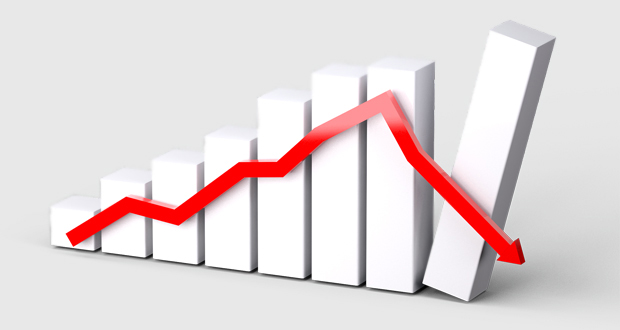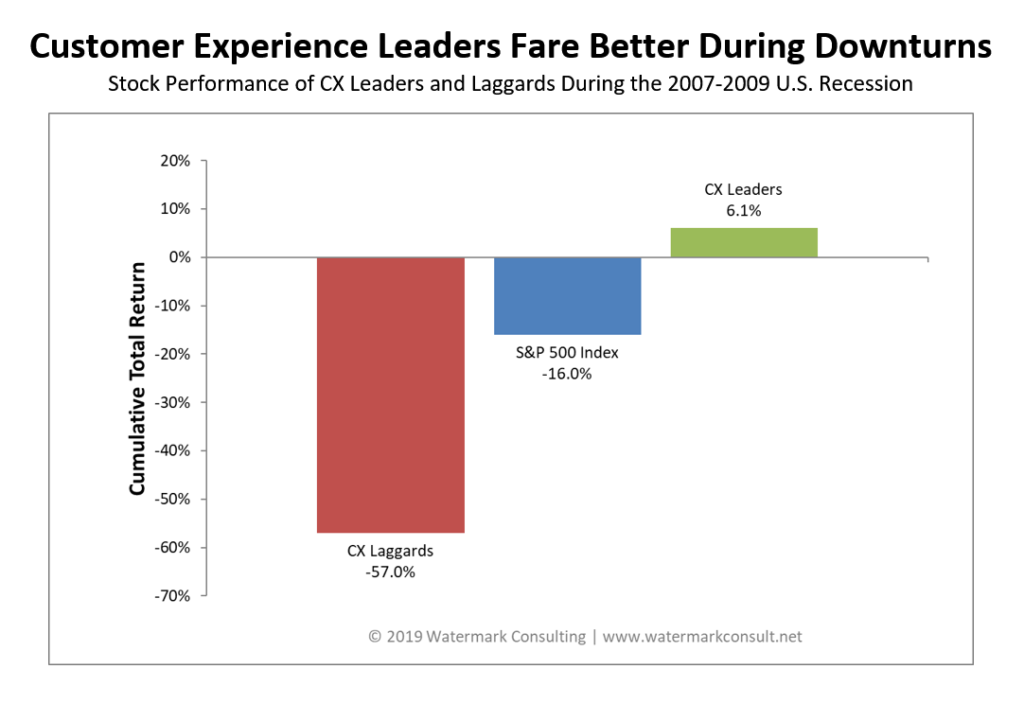
[Editor’s Note: This post was last updated on June 17, 2020.]
The longest economic expansion in American history is officially over. Earlier this month, the National Bureau of Economic Research (the official scorekeeper of economic expansions and contractions) declared that the United States had entered a recession in February 2020.
The last time the U.S. economy went into recession was back in December 2007, so it’s been over twelve years since companies have had to grapple with a downturn and consider how to recession-proof their business. Indeed, given the length of the last expansion, there are plenty of business leaders out there who have no experience navigating a downturn.
For many, the knee-jerk reaction to a slowdown is to cut expenses – curtail travel, freeze hiring, postpone investments, etc. While that can help, it can also hurt. A lot depends on where cuts are made, and how those cuts affect the customer experience.
To illustrate the degree by which customer experience can truly recession-proof a business, we pulled data from Watermark Consulting’s Customer Experience (CX) ROI Study. (The study analyzes the stock market performance of the top-rated companies in customer experience versus the bottom-rated. Follow the link for details on the study’s methodology.)
Specifically, we looked at the performance of CX Leaders and CX Laggards during the period of the last U.S. recession, 2007-2009. (We chose that time span based on the National Bureau of Economic Research’s official designation of when the last contraction began and ended.)

The story the graph tells is quite striking. While CX Leaders weren’t immune from the effects of the recession, they clearly fared better than other companies. Whereas the broader market and the CX Laggards lost significant market value during the contraction, the CX Leaders actually notched positive returns. What does that tell us?
It certainly suggests that the quality of a company’s customer experience does influence its ability to successfully weather a recession. CX Leaders tend to be cushioned from the most severe impacts of a downturn, because they represent one of the last places people cut back (or seek less expensive alternatives), as well as one of the first places to which they return.
Of course, the protection a great customer experience affords during economic slowdowns isn’t unqualified. There are many ways a company can sabotage its own success, despite offering an appealing customer experience (for an example of that, see this story about the 2011 bankruptcy of the top-rated company in customer experience).
However, the data indicates that, in general, companies offering a top-notch customer experience are far better positioned to withstand a recession than those that don’t. For business leaders, this means two things:
- First, when the economy is expanding and/or business is good, invest in the customer experience to further differentiate your company in the marketplace. This might sound obvious, but the fact is, when revenues are growing and the future looks bright, many organizations deprioritize CX investments, under the premise that, if business is booming, customers must already be happy and loyal.
- Second, when the economy sours and/or business slows, continue to invest in customer experience if that’s financially feasible. And if such investments aren’t possible, at the very least be judicious when considering expense cuts which could materially impact CX quality. Such actions might yield short-term gains, but they also introduce serious long-term risks. Furthermore, don’t ignore opportunities to actually improve the customer experience while simultaneously lowering expenses (read more about that approach here).
Famed investor (and CEO of Berkshire Hathaway) Warren Buffett once commented that “You don’t find out who’s been swimming naked when the tide goes out.” His point? Every business leader looks smart during times of economic boom; it’s only when adversity strikes that you see who the real geniuses are.
With an economic recession now upon us, the tide is going out. What will it reveal about your business?
[A version of this article originally appeared on Forbes.com.]
Jon Picoult is founder of Watermark Consulting, a customer experience advisory firm that helps companies impress customers and inspire employees, creating raving fans that drive business growth. Author of “FROM IMPRESSED TO OBSESSED: 12 Principles for Turning Customers and Employees into Lifelong Fans,” Picoult is an acclaimed speaker, and advisor to some of world’s foremost brands. Follow Jon on Twitter or Instagram, or subscribe to his monthly eNewsletter.